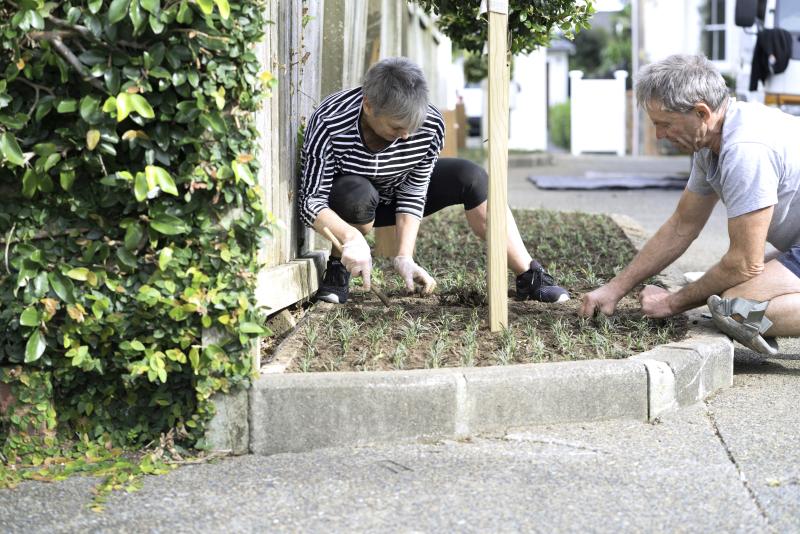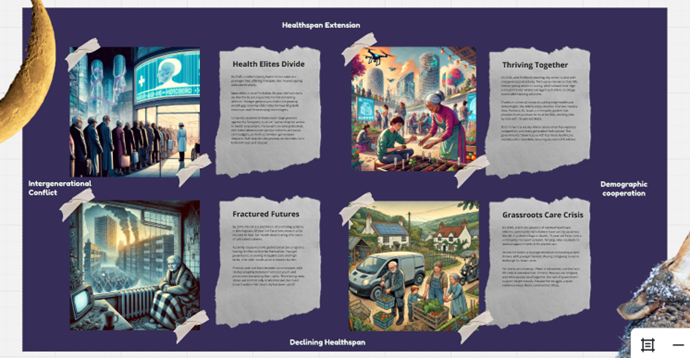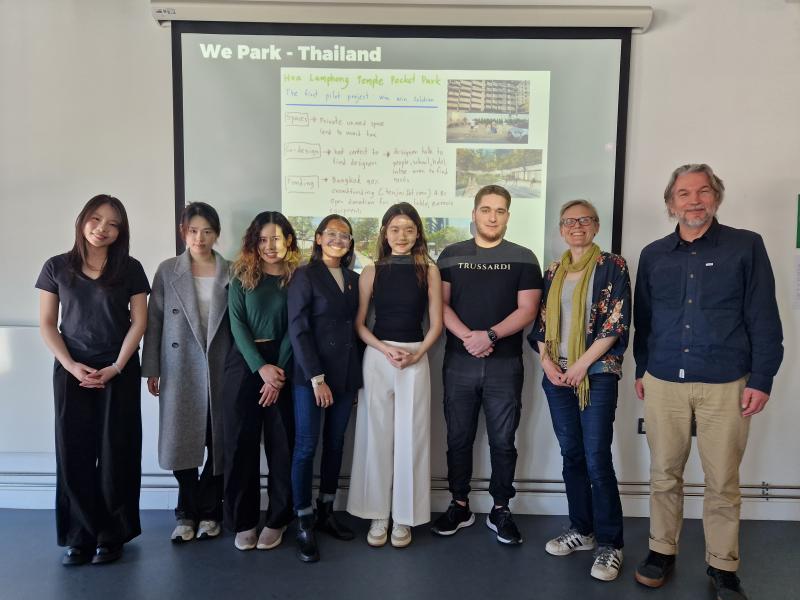Joanna Watson15 May 2025
Across the UK, our population is undergoing a profound demographic shift. In England alone, the number of people aged 65–79 is projected to rise by nearly 30% over the next 40 years, surpassing 10 million within the next 40 years. The over-80s—the fastest-growing age group—will more than double. Meanwhile, the population under 20 is set to decline.
This changing landscape raises important questions for environmental and social justice movements like Friends of the Earth. How will climate change affect older people? How can we support communities to thrive across longer lives? And what role might older generations play in shaping a fairer, greener future? How will we balance the need to fund a sustainability transition against the health and care needs of an older population?
In line with our aim of supporting Friends of the Earth with future readiness, we recently did a deep dive into the data and research to explore the implications of the impact of this trend on our mission. Here’s what we learned.
Ageing as an environmental justice issue
Old age often reflects the accumulation of a lifetime of inequality—or privilege. In the UK, people living in the most deprived areas face twice as many years of ill health at age 65 as those in the least deprived areas. Climate change compounds these disparities: older people are more vulnerable to extreme heat, flooding, and pollution. Marginalised communities are often the most vulnerable to these escalating climate impacts.
“[Climate Change] poses a significant challenge to the health and wellbeing of older people, particularly those who live in vulnerable locations or lack the physical, mental, social, and financial resources needed to avoid or minimise the effects of extreme weather.” Healthy Ageing in a Changing Climate report, 2023
While some older adults enjoy longer, healthier lives—often with more financial security—many face barriers to climate resilience, from inadequate housing to social isolation and digital exclusion. These intersecting challenges make ageing a significant, but often overlooked, environmental justice issue.
A broader perspective: risks and opportunities
Our exploration identified a range of systemic risks linked to an ageing population—from intergenerational tensions over resource allocation to declining public funding for social care and environmental infrastructure. Yet we also found promising opportunities for renewal, solidarity and innovation.
In particular, we were drawn to the potential of reimagining elderhood—not as a story of decline, but as a stage of life rich with experience, insight, and possibility.
Many older people already play vital roles in local climate action, community care and place-based resilience efforts. Some bring deep knowledge of sustainable living, others a lifetime of organising or campaigning. There are also signs of a growing appetite among older adults to leave a positive legacy—whether through volunteering, mentoring, or philanthropy. We wondered what interventions might better support these trends?
Our approach: exploring the landscape of ageing and environmental justice
To better understand the broader forces at play, we conducted a structured analysis using a P.E.S.T. framework. This helped us identify key trends and risks shaping the relationship between demographic change and environmental justice, including:
- Political and economic pressures, such as rising health and pension costs, labour shortages, and intergenerational tensions over public spending priorities.
- Environmental vulnerabilities, with older adults facing higher exposure to heatwaves, air pollution, and climate-related health risks.
- Social inequalities, including disparities in health, housing, digital access, and levels of social isolation, which intersect with age to shape resilience.
- Technological shifts, from digital health to AI, which hold promise for adaptation but also risk excluding those without access or skills.
To make sense of these intersecting forces, we then developed a set of four future scenarios, structured along two axes: healthspan extension vs. healthspan decline, and intergenerational cooperation vs. intergenerational conflict. These scenarios were not predictions, but tools to help us think more creatively—and more critically—about possible and desirable futures. They helped us test assumptions, surface tensions and identify where current pathways might lead if left unchallenged.
Alongside this external analysis, we also undertook a light-touch organisational readiness review, asking: how well is Friends of the Earth positioned to engage with this issue? We identified significant strengths, including a well-established supporter base among older adults, deep experience with justice-led campaigning (especially around energy poverty and health), and a history of community mobilisation. But we also identified gaps in intergenerational organising, unclear routes to deeper engagement with older supporters, and internal constraints—both cultural and resource-based—that could limit our agility, alongside a broader need to embed inclusion across age, race, class, and ability in any future work.
These insights shaped the development of two key framing questions that now guide our thinking. They reflect both the challenges we identified and the areas where we see the greatest potential for creative, justice-oriented exploration.
Two questions to guide future work
As we considered the landscape, two guiding questions emerged to help frame our thinking.
1. How might we reimagine elderhood as a source of wisdom, creativity, and inspiration for environmental action?
This means thinking beyond vulnerability and recognising the potential of older adults to lead, contribute and shape a more inclusive movement. It invites a shift in how society values age—and how organisations like Friends of the Earth engage with their older supporters, volunteers and allies.
2. How might we design playful and meaningful intergenerational experiences to build empathy and drive collective environmental action?
We see promise in spaces where different generations can connect through shared purpose—not only to learn from one another, but to co-create responses to climate and social challenges. While some projects exist, these are often symbolic or one-sided. There is scope to explore more reciprocal, creative, and action-oriented models.
What role might Friends of the Earth play?
Despite the strong foundations of a loyal older supporter base, experience in community-led action, and a long-standing commitment to justice, our challenges include gaps in engaging younger people and limited experience navigating intergenerational dynamics.
As a next step, we’re interested in deepening our understanding of where we can best contribute—whether by supporting existing initiatives, developing small-scale experiments or helping convene conversations across sectors.
We have recently engaged with MSc students in Bristol and at the RCA to explore possible interventions and we’re talking to funders to better understand their success criteria.
We are also reflecting on what it might mean for Friends of the Earth itself to step into the role of an “elder” organisation—drawing on our history of activism to support the next generation of movements and ideas. This is a question we continue to hold with curiosity rather than certainty.
Looking ahead
We are talking to different players in the environment and social justice movements and our exploration has surfaced several gaps in the current landscape. In the UK, elder-led environmental action tends to focus on practical tasks rather than justice-oriented campaigning, with fewer pathways into meaningful activism compared to countries like the US or Canada.
Intergenerational efforts often remain limited in scope, typically centring on the very old and very young, and rarely fostering reciprocal, action-based collaboration or campaigning. Where such spaces do exist, they can feel hierarchical, with older voices dominating. There is also a lack of playful, creative opportunities for older adults, while some storytelling initiatives appear to have reached a point of saturation. At the same time, emerging technologies—particularly those fostering intergenerational empathy—remain underexplored.
This exploration is still unfolding
We know that many organisations, researchers, and communities are already engaging with questions of ageing, justice, intergenerational dynamics and climate resilience—each from their own unique perspective.
We also recognise that in the UK we have recently reached the end of a major research and development funding cycle and it’s important that our work amplifies or extends existing initiatives rather than duplicating. We hope this work adds another layer to that conversation. We’re currently considering our next steps including convening some of the most inspiring and creative pilot projects and exploring this area to consider what’s still needed to create the shifts we’d like to see. We’re particularly interested in connecting with others who are exploring:
- Ageing and climate adaptation
- Intergenerational organising and action
- Narrative and cultural shifts around ageing
- Elder leadership and storytelling in environmental movements
Our aim is to contribute to a broader ecosystem of learning and experimentation—one that recognises the value of longer lives, the urgency of climate action and the need to connect work across generations to build a fairer, more resilient future together.
If this resonates with your work, we’d welcome a conversation.
Note: this article was written by Joanna Watson with the help of ChatGPT.




